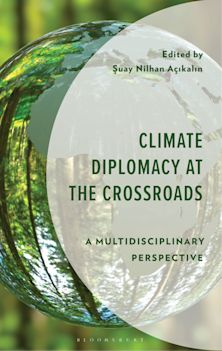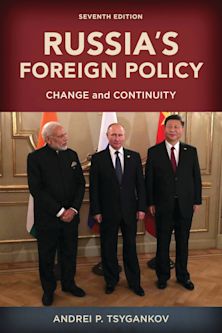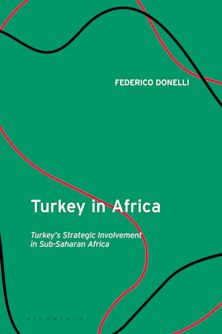- Home
- ACADEMIC
- Politics & International Relations
- Foreign Policy and Diplomacy
- Georgia’s Foreign Policy in the 21st Century
Georgia’s Foreign Policy in the 21st Century
Challenges for a Small State
Georgia’s Foreign Policy in the 21st Century
Challenges for a Small State
You must sign in to add this item to your wishlist. Please sign in or create an account
Description
The South Caucasus is the key strategic region between the Black Sea and Caspian Sea and the regional powers of Iran, Turkey and Russia and is the land bridge between Asia and Europe with vital hydrocarbon routes to international markets. This volume examines the resulting geopolitical positioning of Georgia, a pivotal state and lynchpin of the region, illustrating how and why Georgia's foreign policy is 'multi-vectored', facing potential challenges from Russia, int ernal and external nationalisms, the possible break-up of the European project and EU support and uncertainty over the US commitment to the traditional liberal international order.
Table of Contents
Stephen F. Jones
Part 1: The Uses of Identity in Georgian Foreign Policy
1 Achieving Security as a Small State
Tracey German & Kornely Kakachia
2 The Role of Public Relations and International Politics in Georgian
Democracy Making
Lincoln A Mitchell
3 The Georgian Orthodox Church as a Foreign Policy Actor
Salome Minesashvili
Part 2: The Regional Context
4 In the Caucasus but toward the Black Sea: Georgia's Regional Identity
in Flux
David Aprasidze
5 Georgia's relations with Turkey and Iran
George Sanikidze
6 End of the Post-Soviet Era in Georgia's Foreign Policy?
Georgia's Relations with Former Soviet Republics
Levan Kakhishvili & Alexander Kupatadze
Part 3: Georgia and the 'West'
7 EU-Georgia: Politics, Geography and Identity
Natalie Sabanadze
8 Security, solidarity, specialisation: Understanding Baltic and Polish support
for Georgia's Euro-Atlantic integration
Bidzina Lebanidze & Renata Skardziute-Kereselidze
9 Georgia's Alliance With – Not In - NATO: External Balancing, Autonomy
and Community
Michael Hikari Cecire
Part 4: Georgia and the Great Powers
10 The Story of Two Triangles: Georgia's Russia Policies
Ghia Nodia
11 US-Georgian Relations: Expanding the Capacity of a Small State
Mamuka Tsereteli
Afterword
Tracey German, Stephen F. Jones & Kornely Kakachia
Bibliography
Index
Product details
| Published | 27 Jan 2022 |
|---|---|
| Format | Ebook (PDF) |
| Edition | 1st |
| Extent | 280 |
| ISBN | 9780755645336 |
| Imprint | I.B. Tauris |
| Publisher | Bloomsbury Publishing |
About the contributors
Reviews
-
Georgia's dilemma remains the tension between its identity and its security: how to realise its dominant Western orientation and integrate further into Euro-Atlantic structures, without risking its precarious security and veering into another fateful clash with Russian power. This incisive, nuanced and well-structured collection by Georgian and Western scholars explores this puzzle and offers cautious optimism. It is far more than just a go-to study to explain foreign policy flux in the South Caucasus. It should be read by all academics and practitioners seeking to understand how the foreign policy options of small states like Georgia are not simply tied to their geography.
Roy Allison, Oxford University, UK
-
At a time when Georgia stands at a crossroads, this volume offers the first comprehensive analysis of the country's foreign policy. It brings together an excellent group of scholars to illuminate the complex set of challenges and opportunities confronting Georgia. German, Kakachia and the contributors to this volume masterfully demonstrate that small states are not just objects of great powers' rivalries, but also subjects in their own right. This book provides both a refreshing interpretation of small states' foreign policy and insights into the array of policy options at their disposal. As such, it will be an important reference point for students, scholars and practitioners alike.
Laure Delcour, Associate Professor in International Relations and EU Studies, University Sorbonne Nouvelle, France
-
This volume, examining every nook and cranny of the Georgian foreign policy arena, offers a master-class on the foreign policy of small states. It is essential reading for those wanting to understand the nexus of regional aspirations that undergird the geopolitics of South Caucasus. German, Jones, and Kakachia have brought together authors of extraordinary insight and expertise, who collectively provide a multi-layered examination of Georgia's role in the world and the decisions – both costly and beneficial -- its leadership have made along the way.
Julie A. George, Queens College and the Graduate Center, City University of New York, USA
-
Georgia's Foreign Policy in the 21st Century consists of four sections and eleven substantive chapters that deal with a variety of topics. All of them are written by top-notch scholars who execute their assignments masterfully … both post-Soviet specialists and practitioners dealing with the region would be well-advised to make themselves familiar with this book's contents.
Slavic Review

ONLINE RESOURCES
Bloomsbury Collections
This book is available on Bloomsbury Collections where your library has access.


































